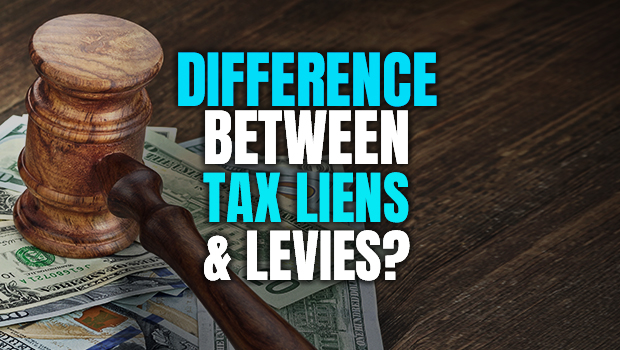The short answer to this question is that one’s bad and the other’s worse. But we’ll provide a more complete answer in this blog post. However, before we provide a more in-depth answer, it’s best to understand what tax liens and levies are.
How Do Tax Levies Work?
Short of being criminally prosecuted for a tax violation, facing a tax levy might be the worst thing you can face as a taxpayer. A tax levy is the legal taking of property to pay off a tax debt. In other words, the IRS, California Franchise Tax Board or other tax authority is withdrawing money from a bank account, repossessing real estate or seizing personal property. Also, any property (or right to property) is potentially subject to a tax levy, unless there’s a law that specifically protects the property from a levy.
How Do Tax Liens Work?
Tax liens aren’t as bad as tax levies, at least in theory. Unlike a tax levy where your property is taken from you, a tax lien is a legal claim the taxing authority places on your property. A tax lien is kind of like a “red flag” or warning to other people who might try to acquire property from a taxpayer.
It’s telling third parties (like creditors) that the property they’re looking at is already claimed by the IRS for a tax debt. So if the third party tries to get it, they may be going after property they can’t legally own.
The IRS gets a tax lien by filing a Notice of Federal Tax Lien, which is a public document. So besides the fact that anyone can see it, it also means it may show up in your credit report. One thing to keep in mind about tax liens is that it doesn’t attach to just one piece of property, like your car or house. It gets attached to practically everything the taxpayer owns.
How Do Tax Liens and Levies Differ?
In short, a tax lien is a legal claim to property for a tax debt, while a tax levy is physically or legally acquiring property to pay off a tax debt. That’s the major difference between the two, but there are a few other differences to be aware of, at least with respect to IRS tax levies and liens.
First, a tax lien will likely show up on a credit report, while a tax levy usually won’t. Second, a tax lien is created after the IRS files a Notice of a Federal Tax Lien. To get a tax levy, basically all the IRS has to do is send several notices to the taxpayer warning them to repay their tax debt or make arrangements with the IRS to repay their debt.
Removing a Tax Lien
Generally speaking, a tax lien can be removed in three situations:
- The tax lien was improperly placed on property.
- The tax debt is somehow satisfied, whether through full payment or another payment arrangement.
- The tax lien somehow becomes unenforceable.
Under certain conditions a lien can be subjugated to permit a property to be re-financed or sold to satisfy the tax liability.
Removing a Tax Levy
The primary methods to release tax levies are to pay the full tax debt or to make other arrangements with the IRS or taxing authority to pay the tax debt. But other ways tax levies can be released is if:
- The levy is causing immediate and significant economic hardship to the taxpayer.
- The levy’s release won’t hinder the ability to collect the tax debt.
- Releasing the levy will make it easier for the taxpayer to pay their back taxes.
A key point to remember is that even though a tax levy gets released, the tax debt still needs to be paid.
Conclusion
If you find yourself getting a notice concerning a tax lien or levy, you need to act quickly. If you don’t, you could find it almost impossible to gain access to credit, sell your property, or receive your full paycheck from your employer. You’ll need to get in touch with the IRS and figure out what’s going on and what you can do to address the situation. In certain situations, talking to a tax attorney or CPA might be a good idea to help you resolve this tax issue.
The good news is Kienitz Tax Law is here to help you with your tax issues. Schedule your FREE consultation today!

